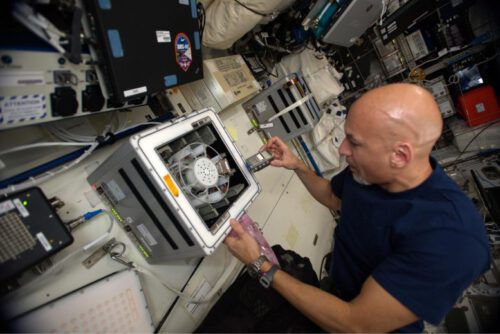The first ever mining experiments conducted in space could pave the way for the development of new technologies designed to help humans explore and establish colonies on distant worlds
[Translation by Dr. Moshe Nachmani]

Tests conducted by astronauts on the International Space Station show that bacteria can help mine useful materials from rocks found on Mars and the Moon. These findings could help in the effort to develop ways to extract metals and minerals - such as iron and magnesium - essential materials for survival in space. According to the researchers, one day it will be possible to use bacteria to break down rocks into soil for growing crops, or to supply minerals that will be used for life support systems, such as those that produce air for breathing and water for drinking. Matchbox-sized mining devices – called 'bio-mining backers' – have been developed by scientists at the Center for Astrobiology at the University of Edinburgh in the UK over a decade. Eighteen of these devices were sent to the space station - which orbits the Earth in a four hundred km orbit - using a SpaceX rocket that was launched from Cape Canaveral in Florida, USA, in July 2019.
!['Backed for biomining' containing small pieces of basalt rock [courtesy of Charles Cockell]](https://www.hayadan.org.il/images/content3/2020/11/Biomining-Reactor-777x5181-1-500x333.jpg)
Small pieces of basalt - a type of rock common on the Moon and Mars - were inserted into each of these devices and immersed in a solution containing bacteria. The experiment, which lasted three weeks, was conducted under conditions of space gravity, with the aim of imitating the environment existing on the Moon and Mars. The findings of the team of researchers suggest that bacteria could increase by four hundred percent the extraction capacity of rare elements from basalt rocks found in the areas of the moon and Mars. Such rare elements are common in advanced technologies used in mobile phones, computers and magnets. Bacteria are also commonly used on Earth in a process called 'bio-mining' in order to extract economically important elements, such as copper and gold, from rocks. The new experiments also provided important data regarding the effects of gravity on the growth of bacterial colonies here on Earth, the researchers add.
The study, which has long been published in the scientific journal Nature Communications., received funding from the British Space Agency and the European Space Agency. Professor Charles Cockell, from the School of Physics and Astronomy at the University of Edinburgh, who led the project, said: "Our experiments laid the foundations for the idea of the technical and scientific feasibility of a biology-based element mining process throughout the solar system. Although it is not economical to mine these elements in space and bring them to Earth, bio-mining in space could help the self-sustainability of humans in space. "For example, our findings suggest that the construction of mines using robots supervised by humans in an area on the surface of the moon called the 'Ocean of Storms' (Oceanus Procellarum), where rocks rich in high concentrations of rare elements are found, could be a fruitful and efficient course of human development. and scientifically beyond the earth". One of the researchers adds and says: "Microorganisms are creatures with extensive uses, and as we deepen our research in space, they will be able to be used to develop a spectrum of processes. Element mining is just one of these possible processes. Findings that will come from experiments such as bio-rocks will not only help to develop technologies that will allow humans to explore the solar system even more, but they will also help scientists from a variety of fields to obtain knowledge that can be useful to all of us here on Earth."
The article describing the research findings
More of the topic in Hayadan:

2 תגובות
The things are fascinating. But nearly 3000 years ago, the Gemara tells us that when they brought the stones to build the first temple, it was not possible to cut them with metal tools because the Torah commanded not to swing iron on it and the intent was not to use metal to cut the altar stones. If so, how did they cut them, they brought the dill There was an animal that was barely visible and he was the one who cut the stones of the altar. There is probably nothing new under the sun.
Before you run to bio-mining in space, I don't see that this is a common process in KDA? Why?
I assume that if it was proven and economical in the DDA - where it is a process that is probably much easier logistically - someone would already be making money from it...
I mean, it's probably not proven yet, it's possible and economical in the future. It sounds a bit early to assume that it will be economic in space...